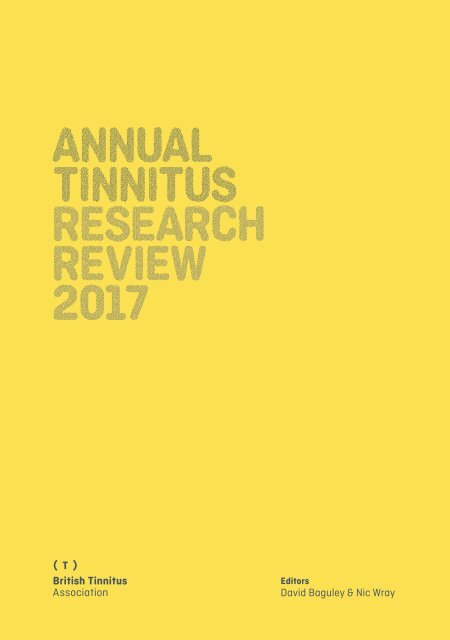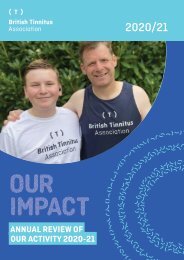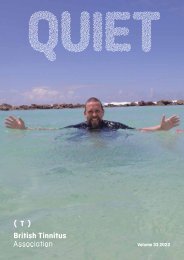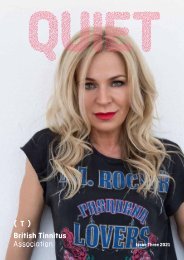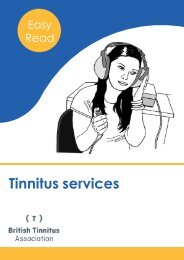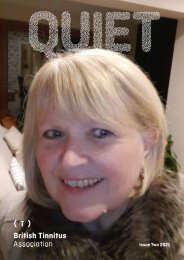I have been extremely fortunate - an interview with Jim Henry
You also want an ePaper? Increase the reach of your titles
YUMPU automatically turns print PDFs into web optimized ePapers that Google loves.
ANNUAL<br />
TINNITUS<br />
RESEARCH<br />
REVIEW<br />
2017<br />
Editors<br />
David Baguley & Nic Wray
Annual Tinnitus Research Review 2017.<br />
Copyright © British Tinnitus Association 2017.<br />
Editors: David Baguley & Nic Wray<br />
The editors would like to th<strong>an</strong>k all the contributors for their<br />
support <strong>an</strong>d enthusiasm. We would also like to th<strong>an</strong>k the copyright<br />
owners of the images <strong>an</strong>d figures reproduced in this publication for<br />
their permission to reproduce them either directly or via licence.<br />
We believe that all such work has <strong>been</strong> acknowledged, but please<br />
contact Nic Wray on nic@tinnitus.org.uk if <strong>an</strong>y <strong>have</strong> <strong>been</strong><br />
inadvertently omitted.<br />
British Tinnitus Association<br />
Unit 5 Acorn Business Park<br />
Woodseats Close<br />
Sheffield<br />
S8 0TB<br />
www.tinnitus.org.uk<br />
info@tinnitus.org.uk<br />
0114 250 9933<br />
Registered charity no. 1011145 Comp<strong>an</strong>y limited by guar<strong>an</strong>tee no.<br />
2709302, registered in Engl<strong>an</strong>d.
T<br />
British Tinnitus Association<br />
DR JAMES HENRY<br />
Research Professor<br />
National Center for<br />
Rehabilitative Auditory<br />
Research<br />
James <strong>Henry</strong>, PhD. is certified <strong>an</strong>d<br />
licensed audiologist <strong>with</strong> a doctorate<br />
in Behavioral Neuroscience.<br />
He is employed at the National<br />
Center for Rehabilitative Auditory<br />
Research (NCRAR) located at the<br />
VA Portl<strong>an</strong>d Health Care System.<br />
He is also Research Professor in<br />
the Department of Otolaryngology<br />
– Head & Neck Surgery at Oregon<br />
Health & Science University. For<br />
the past 23 years he has devoted<br />
his career to tinnitus research. He<br />
has received funding for 25 gr<strong>an</strong>ts<br />
to study various aspects of tinnitus<br />
clinical m<strong>an</strong>agement. His overall goal<br />
is to develop <strong>an</strong>d validate clinical<br />
methodology for effectively helping<br />
individuals who are afflicted <strong>with</strong><br />
bothersome tinnitus.<br />
I HAVE BEEN<br />
EXTREMELY<br />
FORTUNATE:<br />
Dr James <strong>Henry</strong><br />
talks to Nic Wray<br />
What made you first interested in tinnitus? How did<br />
your research career develop to where it is now?<br />
I became interested in pursuing a career in Audiology<br />
because of my deaf daughter. When she was 5 years<br />
old I returned to school to earn <strong>an</strong> M.S. in Audiology.<br />
Following school I was hired as a research audiologist<br />
at the Veter<strong>an</strong>s Affairs hospital in Portl<strong>an</strong>d, Oregon<br />
where I discovered <strong>an</strong> avid interest in research. I<br />
spent the next 6 years in the Behavioral Neuroscience<br />
doctoral program at Oregon Health & Science<br />
University (OHSU). My OHSU research lab was<br />
directed by Dr Jack Vernon, <strong>an</strong>d my research advisor<br />
was Dr Mary Meikle. They were both pioneers in the<br />
field of tinnitus <strong>an</strong>d I had the great opportunity to<br />
learn from them. My doctoral dissertation focused on<br />
measurement of tinnitus, which cemented my interest<br />
in doing tinnitus research as a career. I <strong>have</strong> <strong>been</strong><br />
doing it ever since.<br />
My first funded gr<strong>an</strong>t was a pilot study to perform<br />
computer-automated tinnitus measurement. I <strong>have</strong><br />
continued that work to the present. I also became<br />
interested in Tinnitus Retraining Therapy (TRT) <strong>an</strong>d<br />
attended Dr Jastreboff’s TRT training course in 1997.<br />
I received a gr<strong>an</strong>t in 1999 to compare outcomes<br />
between TRT <strong>an</strong>d Tinnitus Masking (Dr Vernon’s<br />
method) <strong>an</strong>d that study led to two other studies<br />
evaluating TRT. My combined experiences led to the<br />
development of Progressive Tinnitus M<strong>an</strong>agement<br />
(PTM), which is the method we <strong>have</strong> focused on for<br />
about the last 10 years.<br />
What research are you currently involved in?<br />
I would <strong>have</strong> to say that further refinement <strong>an</strong>d<br />
exp<strong>an</strong>sion of PTM is my highest priority. What has<br />
always driven my research is the desire to improve<br />
clinical services for people who suffer from tinnitus.<br />
Until a cure is discovered, the best we c<strong>an</strong> do is to<br />
mitigate effects of tinnitus <strong>an</strong>d help people live normal<br />
lives in spite of their unremitting tinnitus. PTM is a<br />
stepped-care program of clinical m<strong>an</strong>agement, <strong>an</strong>d the<br />
intervention levels focus on teaching self-help skills<br />
to enable people to know what to do whenever their<br />
tinnitus is bothersome.<br />
26<br />
Annual Tinnitus Research Review 2017
I <strong>have</strong> <strong>been</strong> <strong>extremely</strong> <strong>fortunate</strong>: Dr James <strong>Henry</strong> talks to Nic Wray T British Tinnitus Association<br />
We <strong>have</strong> adapted PTM to provide the self-help<br />
education over the telephone. We recently completed<br />
a r<strong>an</strong>domised controlled trial (RCT) to evaluate “Tele-<br />
PTM” <strong>an</strong>d observed very positive outcomes. This<br />
demonstrated the ability to provide tinnitus services<br />
remotely, which makes these services accessible<br />
to <strong>an</strong>yone, <strong>an</strong>ywhere. We are working to continue<br />
developing <strong>an</strong>d testing Tele-PTM.<br />
We are currently in the early stages of conducting<br />
<strong>an</strong> RCT to evaluate the Desyncra device for tinnitus<br />
treatment. Particip<strong>an</strong>ts are r<strong>an</strong>domised to either be<br />
treated <strong>with</strong> the device or to receive “st<strong>an</strong>dard-ofcare.”<br />
Systematic reviews <strong>have</strong> revealed that Cognitive<br />
Behavioral Therapy (CBT) has the strongest research<br />
evidence for tinnitus m<strong>an</strong>agement, so we are using<br />
CBT as our st<strong>an</strong>dard-of-care control group.<br />
A question of particular relev<strong>an</strong>ce to the Veter<strong>an</strong>s<br />
Health Administration is whether the onset of tinnitus<br />
for a Veter<strong>an</strong> m<strong>an</strong>y years after leaving the military c<strong>an</strong><br />
be caused by noise or other ototoxins experienced<br />
during military service. This question is import<strong>an</strong>t<br />
because tinnitus is the most prevalent of all serviceconnected<br />
disabilities for U.S. Veter<strong>an</strong>s. At <strong>an</strong>y point<br />
in their lifetimes, Veter<strong>an</strong>s c<strong>an</strong> claim tinnitus caused by<br />
exposures during the military, <strong>an</strong>d thous<strong>an</strong>ds of these<br />
claims are received every month. The NOISE Study<br />
(Noise Outcomes in Servicemembers Epidemiology<br />
Study), which has <strong>been</strong> underway for 3 years,<br />
enrolls military members <strong>an</strong>d recently-discharged<br />
Veter<strong>an</strong>s who complete comprehensive testing <strong>an</strong>d<br />
questionnaires. The study is designed as a longitudinal<br />
study to evaluate Veter<strong>an</strong> particip<strong>an</strong>ts <strong>an</strong>nually for 20-<br />
30 years.<br />
As I mentioned, we continue to develop our computerautomated<br />
tinnitus evaluation system (TES). The TES<br />
performs st<strong>an</strong>dard tinnitus psychoacoustic testing<br />
(loudness match, pitch match, minimum masking<br />
level, residual inhibition) plus special tests that <strong>have</strong><br />
<strong>been</strong> developed. Our goal is to develop st<strong>an</strong>dardised<br />
methodology that is practical <strong>an</strong>d informative for<br />
clinical <strong>an</strong>d research application.<br />
<strong>an</strong>imals (following noise exposure or salicylate) <strong>with</strong><br />
tinnitus show deficits in detecting these silent gaps.<br />
It is hypothesised that hum<strong>an</strong>s <strong>with</strong> tinnitus will also<br />
show such deficits. Our site is testing the method <strong>with</strong><br />
hum<strong>an</strong>s.<br />
Are there <strong>an</strong>y particular challenges in working <strong>with</strong><br />
the Veter<strong>an</strong>s population <strong>with</strong> tinnitus?<br />
I’m in research so I don’t directly see patients at<br />
the Veter<strong>an</strong>s Affairs (VA) hospital where I work. As<br />
I mentioned earlier tinnitus is the most prevalent of<br />
all service-connected disabilities for Veter<strong>an</strong>s. As<br />
of 2015, almost 1.5 million Veter<strong>an</strong>s had received a<br />
service-connected tinnitus disability award, me<strong>an</strong>ing<br />
the VA decided they <strong>have</strong> tinnitus (the disability) <strong>an</strong>d<br />
that it was caused by exposures while in the military<br />
(the service connection). I am in const<strong>an</strong>t touch <strong>with</strong><br />
numerous VA audiologists who tell me about their<br />
experiences <strong>with</strong> Veter<strong>an</strong>s who report tinnitus. It is<br />
clear that at least one out of three Veter<strong>an</strong>s who attend<br />
Audiology clinics <strong>have</strong> tinnitus – either as a primary<br />
or a secondary problem. There are over 1300 VA<br />
audiologists working at almost 500 Audiology sites of<br />
care, <strong>an</strong>d they had almost 2.4 million encounters <strong>with</strong><br />
Veter<strong>an</strong> patients last year. Without question tinnitus is<br />
a huge problem for Veter<strong>an</strong>s <strong>an</strong>d for the VA. Probably<br />
the biggest challenge in meeting the tinnitus needs of<br />
these Veter<strong>an</strong>s is the lack of st<strong>an</strong>dardisation between<br />
audiologists <strong>an</strong>d between Audiology sites of care. A<br />
primary reason tinnitus services are inconsistent is<br />
that most Audiology doctoral (Au.D.) programs in the<br />
U.S. do not provide subst<strong>an</strong>tive training in tinnitus<br />
m<strong>an</strong>agement. Further, despite VA recommendations<br />
for tinnitus m<strong>an</strong>agement <strong>an</strong>d the Clinical Practice<br />
Guideline for tinnitus published in 2014 by the<br />
Americ<strong>an</strong> Academy of Otolaryngology/Head & Neck<br />
Surgery Foundation (AAO-HNSF), VA audiologists<br />
are typically unfamiliar <strong>with</strong> these recommended<br />
procedures <strong>an</strong>d do not adhere to <strong>an</strong>y particular<br />
protocol for tinnitus m<strong>an</strong>agement. This is not just a<br />
VA problem, but <strong>an</strong> international problem – evidencebased<br />
guidelines for tinnitus m<strong>an</strong>agement exist, but<br />
patients c<strong>an</strong>not expect to received evidence-based<br />
care for their tinnitus.<br />
We are also collaborating <strong>with</strong> Dr Jeremy Turner who<br />
has developed a gap detection test for objective<br />
detection of tinnitus. The method measures whether<br />
a silent gap embedded in a background of sound<br />
c<strong>an</strong> be detected. Numerous studies <strong>have</strong> shown that<br />
Annual Tinnitus Research Review 2017 27
I <strong>have</strong> <strong>been</strong> <strong>extremely</strong> <strong>fortunate</strong>: Dr James <strong>Henry</strong> talks to Nic Wray T British Tinnitus Association<br />
What aspect of your work personally gives you the<br />
greatest satisfaction?<br />
Without a doubt, helping people is the most satisfying<br />
aspect of my work. We do not run a clinic, but our<br />
controlled trials require m<strong>an</strong>y particip<strong>an</strong>ts who are<br />
signific<strong>an</strong>tly bothered by their tinnitus. We regularly<br />
hear back from them about how much they <strong>have</strong><br />
<strong>been</strong> helped. I further derive great pleasure from<br />
completing studies <strong>an</strong>d getting them published, which<br />
exp<strong>an</strong>ds work in my lab around the world <strong>with</strong> the<br />
potential of helping m<strong>an</strong>y more people.<br />
You recently were awarded the Jerger Career<br />
Award by the Americ<strong>an</strong> Academy of Audiology.<br />
How did that feel?<br />
It's <strong>an</strong> unbelievable honour for me <strong>an</strong>d I had no<br />
idea I was even nominated. I discovered early on<br />
that the best research, at least in my case, comes<br />
from collaborative efforts. When you put a bunch<br />
of brains together working on the same project, it<br />
is synergistically effective. I <strong>have</strong> to give credit to<br />
the m<strong>an</strong>y individuals who <strong>have</strong> contributed to my<br />
research. I <strong>have</strong> <strong>been</strong> <strong>extremely</strong> <strong>fortunate</strong> to work<br />
<strong>with</strong> m<strong>an</strong>y very talented <strong>an</strong>d gifted individuals. I am<br />
const<strong>an</strong>tly amazed at the quality of work they do, <strong>an</strong>d<br />
how much they know—they make me look good. The<br />
NCRAR is <strong>an</strong> ideal auditory research environment<br />
because it provides all of the necessary infrastructure.<br />
Finally, I <strong>have</strong> <strong>been</strong> supported by the VA Office of<br />
Research <strong>an</strong>d Development for my entire career.<br />
They <strong>have</strong> const<strong>an</strong>tly stepped up to support tinnitus<br />
research <strong>an</strong>d the NCRAR. So, while my name goes on<br />
the award, it reflects the efforts of m<strong>an</strong>y people over<br />
m<strong>an</strong>y years.<br />
You <strong>have</strong> <strong>been</strong> involved in tinnitus research for<br />
m<strong>an</strong>y years now. What research topic or question<br />
currently excites you?<br />
I’m particularly interested in the use of sound to<br />
suppress tinnitus. We <strong>have</strong> known for decades<br />
that residual inhibition c<strong>an</strong> be induced consistently<br />
for the majority of people <strong>with</strong> tinnitus. Residual<br />
inhibition is usually a temporary effect of tinnitus<br />
suppression lasting up to a few minutes. I am<br />
interested in the prospect of a systematic study to<br />
determine acoustical parameters that might prolong<br />
residual inhibition such that this could become a<br />
clinically viable technique. There has also <strong>been</strong><br />
research looking at different acoustical protocols<br />
for suppressing tinnitus on a long-term basis. Sound<br />
c<strong>an</strong> be “notched” around the tinnitus frequency,<br />
“matched” to the tinnitus frequency, or delivered<br />
in some way intended to m<strong>an</strong>ipulate brain plasticity<br />
such that tinnitus-related neural activity is disrupted,<br />
ultimately resulting in a reduction or elimination of the<br />
tinnitus percept. I <strong>have</strong> begun work in this area <strong>an</strong>d<br />
find it to be <strong>an</strong> exciting line of research.<br />
Moving away from your own research, what’s your<br />
favourite piece of tinnitus research that’s <strong>been</strong> done<br />
by others, <strong>an</strong>d why?<br />
That’s a tough question to <strong>an</strong>swer because there is so<br />
much good research out there. I <strong>have</strong> to give credit<br />
to the m<strong>an</strong>y “unsung heroes” who are doing tinnitus<br />
mech<strong>an</strong>isms research in their laboratories. I visited<br />
Dr Richard Salvi’s lab at the University of Buffalo (in<br />
New York) not too long ago <strong>an</strong>d had the opportunity<br />
of speaking <strong>with</strong> all of the researchers working in his<br />
lab. I was astounded at the variety <strong>an</strong>d quality of the<br />
research that is being done there. This kind of work<br />
gives me great hope that there will indeed be a cure<br />
for tinnitus in the future.<br />
What do you think is the biggest challenge facing<br />
tinnitus research at the moment?<br />
The biggest challenge is finding a cure for tinnitus,<br />
i.e., some treatment that c<strong>an</strong> safely eliminate the<br />
perception of tinnitus. Of course this challenge is<br />
particularly difficult because finding a cure will likely<br />
require underst<strong>an</strong>ding the neural mech<strong>an</strong>ism(s) of how<br />
tinnitus is triggered <strong>an</strong>d what sustains it over time.<br />
What are the challenges of tr<strong>an</strong>slating current<br />
research into clinical practice?<br />
We c<strong>an</strong> experiment <strong>with</strong> invasive techniques on<br />
<strong>an</strong>imals to evaluate potential methods of treatment<br />
for tinnitus. We must use clever procedures, however,<br />
to infer the existence of tinnitus in <strong>an</strong>imals <strong>an</strong>d<br />
whether <strong>an</strong>y m<strong>an</strong>ipulations actually suppress the<br />
tinnitus. With hum<strong>an</strong>s, we c<strong>an</strong>not normally conduct<br />
invasive techniques, but hum<strong>an</strong>s c<strong>an</strong> tell us exactly<br />
what they are perceiving <strong>an</strong>d if there is <strong>an</strong>y ch<strong>an</strong>ge<br />
in their perception. So, I’d say the big challenge is<br />
in tr<strong>an</strong>slating tinnitus mech<strong>an</strong>isms research that is<br />
done in <strong>an</strong>imals to see if inferences based on the<br />
research hold true <strong>with</strong> hum<strong>an</strong>s. An example of this<br />
is Dr Turner’s study that I’ve already mentioned. The<br />
next phase of his research is to determine if his gap<br />
detection method that has <strong>been</strong> shown to work in<br />
<strong>an</strong>imals also works in hum<strong>an</strong>s.<br />
28<br />
Annual Tinnitus Research Review 2017
I <strong>have</strong> <strong>been</strong> <strong>extremely</strong> <strong>fortunate</strong>: Dr James <strong>Henry</strong> talks to Nic Wray T British Tinnitus Association<br />
What might you say to a sufferer who asks you<br />
whether there will ever be a cure for tinnitus?<br />
I would first point out that there is abund<strong>an</strong>t research<br />
being carried out around the world that is targeted at<br />
finding a cure for tinnitus. Tinnitus is gaining greater<br />
visibility <strong>an</strong>d the number of tinnitus-related studies<br />
is continually increasing. In 2016 alone, there were<br />
368 peer-reviewed publications listed in PubMed<br />
<strong>with</strong> tinnitus in the title. Compare this number to the<br />
approximately 10 articles per year 40 years ago, 50 per<br />
year 20-30 years ago, <strong>an</strong>d 100 per year just 10 years<br />
ago. This should be encouraging news to <strong>an</strong>yone<br />
suffering from tinnitus.<br />
Is there <strong>an</strong>y advice you would give to others<br />
considering a research path in tinnitus?<br />
I strongly endorse the clinical model of practicing<br />
evidence-based medicine. Such evidence is derived<br />
mainly from systematic reviews, which summarise<br />
results of controlled trials to specify, <strong>with</strong> minimal<br />
bias, what methods <strong>have</strong> <strong>an</strong> evidence-base in the<br />
literature. In my area of study, i.e. clinical research to<br />
develop <strong>an</strong>d validate methods of tinnitus m<strong>an</strong>agement,<br />
controlled trials are desperately needed. We c<strong>an</strong> get<br />
excited about new methods, devices, etc., but until<br />
they are reported in systematic reviews as showing<br />
benefit, the credible evidence is limited or nonexistent.<br />
For these reasons, my advice for clinical researchers<br />
would be to design <strong>an</strong>d perform controlled trials to<br />
test the efficacy of <strong>an</strong>y method that is purported to be<br />
efficacious.<br />
Finally, is there <strong>an</strong>ything else you would<br />
like to share <strong>with</strong> our readers?<br />
This question could really put me on a soapbox<br />
because I am passionate about the need to<br />
st<strong>an</strong>dardise the field of tinnitus m<strong>an</strong>agement. In spite<br />
of what seems to be a vast amount of research taking<br />
place, there is little evidence that researchers are<br />
collaborating to make their research more efficient.<br />
This “silo” approach could be greatly improved by<br />
creating <strong>an</strong> international committee of the most<br />
prominent tinnitus researchers <strong>an</strong>d assigning them<br />
the task of working together to establish common<br />
goals <strong>an</strong>d methodologies for attaining those goals.<br />
St<strong>an</strong>dardisation in tinnitus m<strong>an</strong>agement techniques<br />
is needed <strong>an</strong>d that will require some kind of<br />
credentialing program for clinici<strong>an</strong>s to become<br />
qualified <strong>an</strong>d certified “tinnitus care providers.” Such<br />
a program will require a p<strong>an</strong>el of experts to create<br />
a program of official verification that a provider has<br />
achieved criterion st<strong>an</strong>dards regarding training,<br />
supervision, <strong>an</strong>d experience. Until we reach this point,<br />
the tinnitus sufferer is mostly at the mercy of <strong>an</strong>yone<br />
who claims to offer help.<br />
“The biggest challenge<br />
is finding a cure for<br />
tinnitus, i.e., some<br />
treatment that c<strong>an</strong><br />
safely eliminate<br />
the perception of<br />
tinnitus. Of course<br />
this challenge is<br />
particularly difficult<br />
because finding a<br />
cure will likely require<br />
underst<strong>an</strong>ding the<br />
neural mech<strong>an</strong>ism(s)<br />
of how tinnitus is<br />
triggered <strong>an</strong>d what<br />
sustains it over time."<br />
- Dr James <strong>Henry</strong><br />
Annual Tinnitus Research Review 2017 29


